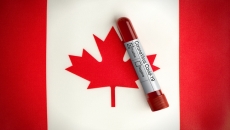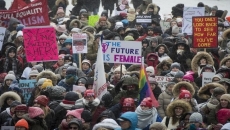Canada is on track to complete its millionth test for COVID-19 sometime in the next 24 hours even as the country's biggest province continues to struggle to hit its own testing target. Dr. Theresa Tam, the chief public health officer of Canada, reported that as of Wednesday morning, more than 970,000 tests had been completed nationwide since the start of the COVID-19 pandemic in Canada.
Canada has typically completed between 20,000 and 30,000 tests a day over the last week. Tam has previously said she would like to see about 60,000 tests a day.
Tam says the number of tests being completed is critical as provinces begin to reopen their economies and the spread of the virus in Canada continues to slow. Being able to test suspected cases and then trace all their contacts to prevent another spike in cases is fundamental to Canada's learning to live with COVID-19, Tam said.
Ontario reported 412 new cases of COVID-19 Wednesday, but completed fewer than 13,000 tests, at least the second day in a row the province came up far shy of its goal to do at least 16,000 tests a day by the end of April.
Ontario Premier Doug Ford blasted some of his province's regional public health officers Tuesday for falling down on the job of ensuring enough tests were completed.
Meanwhile, the House of Commons is starting its second in-person sitting of the special COVID-19 committee in Ottawa this afternoon, where the government is expected to face a grilling from opposition parties over its handling of the COVID-19 crisis.
A small number of MPs are to convene for a once-a-week, in-person sitting of the House of Commons and they are expected to zero in on the perceived deficiencies of the billions of dollars in emergency aid programs the federal government has implemented to cushion the economic impact of the pandemic.
Among the criticisms, the outraged reaction of Canadian farmers to the $252 million in support announced Tuesday for the agri-food sector — far less than the $2.6 billion deemed necessary by the Canadian Federation of Agriculture.
Prime Minister Justin Trudeau will not be in the Commons to deflect the criticism — he is to be at a military base in Trenton, Ont., for a repatriation ceremony for the six members of the Canadian Forces who died in last week's helicopter crash off the coast of Greece.
Nor did he give his usual morning briefing on the COVID-19 crisis.
The absence of the prime minister and lack of any new announcements shifts the focus from what the government is doing to combat the pandemic to what opposition parties contend it is doing wrong.
A virtual sitting of MPs on Tuesday featured plenty of criticism about the agriculture-support program falling short of what's needed — from all parties.
Both Trudeau and Agriculture Minister Marie-Claude Bibeau argued that farmers already have a number of existing income stabilization programs to fall back on. Still, Trudeau called the $252 million just an initial investment, indicating that more support is coming.
Farmers have been hit by reduced demand for some of their crops as a result of restaurants' being closed since mid-March to curb the spread of the disease. And they've had difficulty getting the usual number of needed temporary foreign workers into the country to work on farms.
Beef, pork and poultry producers have been faced with the prospect of having to cull their animals due to reduced capacity at meat processing plants, which have been particularly vulnerable to outbreaks of COVID-19 partly because large numbers of employees work in close quarters.
In addition to criticism of the support provided so far for farmers, each opposition party has favoured themes they are likely to continue raising.
The Conservatives have lately focused on the $2,000-per-month Canada Emergency Response Benefit for those thrown out of work by the pandemic, arguing that it provides a disincentive to work.
New Democrats have been pointing out the gaps in the CERB and pushing for a universal benefit available to everyone hurt by the pandemic.
The NDP and the Bloc Quebecois have been demanding assurances — yet to be given — that companies that use tax havens to avoid paying their fair share of taxes will not benefit from any of the federal emergency aid programs.
And all opposition parties, particularly the Bloc, have been urging the government to provide financial support for seniors — something that is expected to be announced later this week.






